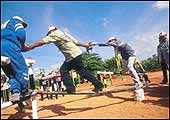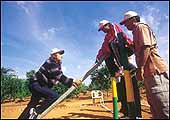








|
MANAGING
Going To War
As the battles for marketshares get
bloody, companies are sending their executives out to virtual frontlines
for crash courses in commando-like fighting and survival skills.
By Vinod
Mahanta with Venkatesha Babu &
Abir Pal
 There are
men swarming all over inside the 'rock fortress'. A young 20-something is
balanced precariously on a rope bridge, trying hard to slow its violent
swing so that he can cross over to safety. About 50 feet away, another
man, slightly older, is on his knees and elbows, trying to crawl through a
pipe-tunnel. And at the far end of the training camp, trainers are helping
a man dangling from a rope climb the jagged face of a rock. Keeping an
eagle-eye on the activities are swarthy instructors with crew-cuts and
stiff spines that only years of military discipline can give. Scene out of
Afghanistan? There are
men swarming all over inside the 'rock fortress'. A young 20-something is
balanced precariously on a rope bridge, trying hard to slow its violent
swing so that he can cross over to safety. About 50 feet away, another
man, slightly older, is on his knees and elbows, trying to crawl through a
pipe-tunnel. And at the far end of the training camp, trainers are helping
a man dangling from a rope climb the jagged face of a rock. Keeping an
eagle-eye on the activities are swarthy instructors with crew-cuts and
stiff spines that only years of military discipline can give. Scene out of
Afghanistan?
Hardly. The setting is Capt. (retired) S.
Ravi's Pegasus Institute for Excellence at Kallukote, 65 kilometres
outside Bangalore. And the people honing their rock-climbing and
ground-crawling skills are neither army recruits nor wannabe militants.
They are warriors nevertheless-the white-collar variety-who've been sent
by their employers to acquire skills that will help them fight and win in
the recession-ravaged corporate battleground.
Welcome to the new rules of motivating in a
downturn. As markets stagnate, bottomlines shrink, layoffs rule, and
executive morale hits a new low, corporations are abandoning old methods
of motivation (pep talks, rewards, and incentives) and turning to new,
revolutionary techniques of building self-confidence, team spirit, goal
orientation, and leadership skills. Says Jagdish Kini, CEO of Airtel
(Karnataka), who was working on his leadership skills at Kallukote the day
BT paid a visit: ''Outward-bound learning like this provides us an
opportunity to test our openness, adaptability, introspection,
involvement, and lateral-thinking abilities.''
 |
| The Dynamic
Obstacle Course: It's about teamwork, co-ordination and balance.
Much like your corporation |
 |
| The Tarzan
Swing: No Jane here, but if you don't get a good grip, you'll be
pulp. Sounds like your next deal? |
 |
| More
Obstacles: Be focused, confident, and committed. Only then will you
reach target |
Sink Or Swim
Indeed. Throwing a bunch of people into a
situation where the life of each depends on the other, helps build trust
and team spirit like no classroom workshop can. Agrees Sudeep Banerjee,
Chief Executive (Operations), Wipro Technologies: ''The kind of response
you get in outdoor brainstorming sessions is simply something else.''
Such physical and mental toughening is
becoming increasingly important because, on the one hand, job security is
disappearing, and on the other, demands on performance have shot up. At
the same time, companies are willing to invest in and reward the
super-performers.
It was with this in mind that Coca-Cola India
recently sent 25 members of its Pegasus Club-(nothing to do with Ravi's
outfit) a club of Coke's top 100 performers-to Leh. The team comprised
executives in high-pressure jobs from across Coke's operations in India,
and was led by the CEO himself-Alex von Behr. The cola hot-shots spent
three days in Leh with their head honcho, discussing business plans,
playing management games, and counselling. Says Sunil Kishore, Vice
President (hr), Coca-Cola India: ''Activities like this one do a lot of
things. But importantly, it puts our top-guns in direct contact with the
CEO, and aligns their performance with the vision of the corporation.''
Organisations that are young and culturally
diversified also find using non-traditional motivational techniques a
quick way of cutting across barriers and building a sense of oneness. Take
Hughes Telecom, for example. Early this year, the company sent six batches
of 20-22 people each to the Sanjay Gandhi National Park in Borivili,
Mumbai. The participants, ranging from the CEO to assistant managers,
spent two nights and three days at the park doing everything from pitching
tents to rappelling to rafting, besides playing interactive games.
Hughes' rationale for building such
well-oiled, in-the-groove, teams is simple. The Rs 200-crore company is
barely four years old and has drawn people from as many as 150 different
organisations. Its nature of business also requires that its employees
have a diverse set of skills ranging from hard-core information technology
to networking to customer services to planning to marketing. Says Gautam
Chainani, Hughes' Vice President for hr, and one of the participants: ''It
really animated issues like problem-solving and decision-making as a
group, and helped the participants appreciate each other's style of
working.''
Think your executives lack the
killer-instinct? No problem. Mumbai-based Khursheed Merchant's specialised
management programmes on empowerment, stress management and
confidence-building can help. Merchant, who was coached in the UK and has
worked in the US and Africa, uses some dare-devil techniques to help
people conquer phobias and believe in self. Walking on burning charcoal
(fire-walking) and glass shards, for instance.
Sylvester Lobo, Executive Editor of
dqChannels India (part of the Delhi-based Cyber Media Group), attended one
such workshop conducted by Merchant. His team consisted of 30 senior
executives-from MD to regional managers. The objective was to develop a
fresh approach to oneself, colleagues, and tackling problems. The tasks
included blindfolding a colleague and walking him or her through a busy
intersection. ''It's all about trusting in your partner and totally
letting go,'' says Lobo.
Ironically, the current downturn is proving
to be a good time for companies to embark on such motivational efforts.
For one, getting a smaller team to deliver more under adverse
circumstances is becoming increasingly critical. For another, surplus
man-hours is allowing companies the luxury of pulling its employees off
shopfloors and markets, and packing them off to training camps. Says Ravi
of Pegasus: ''The experience that people get here is not something they
forget once they are back in their offices. In fact, every time they are
faced with a seemingly difficult situation, they can tell themselves:
''I've handled worse situations, I can do this.''
Come in, Rambo. Over.
|

